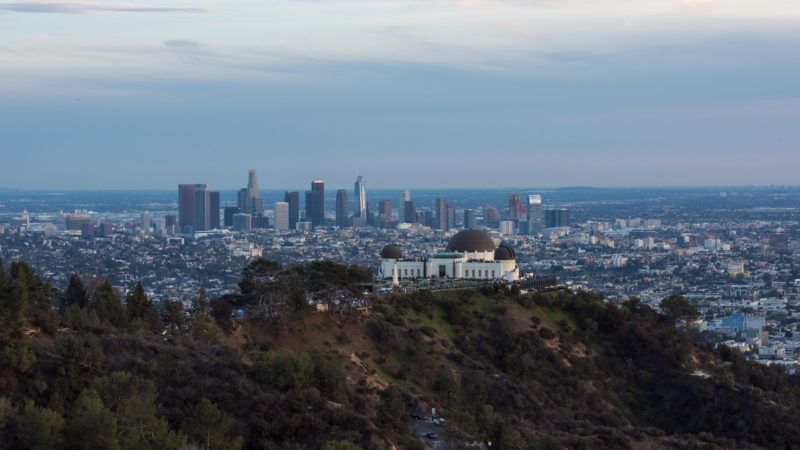Environmentalists Look on the Bright Side of COVID-19
The coronavirus pandemic has led to less air pollution...unless you count all the germs.

Millions of people sheltering in their homes for fear of catching a deadly virus is not normally a sign of a healthy environment. Yet some environmentalists and members of the media think they've found a big silver lining in this whole global pandemic thing: Harmful emissions are down, and quarantine life is acclimating people to more sustainable ways of living.
"There's an unlikely beneficiary of the coronavirus: the planet," says a CNN headline about extreme quarantine measures in Wuhan, China. "It seems the lockdown had an unintended benefit—blue skies." Nice!
One Stanford professor, drawing on not-necessarily-reliable Chinese government statistics about COVID-19 deaths, has argued that the virus is saving lives in that country by causing this reduction in air pollution.
Here in the U.S., sharp declines in traffic caused by coronavirus-related shutdowns of economic and social life are being treated as a gleaming example of the way things could be.
I could document this golden light, this blue, this clear air all day long. Five years since emissions didn't haze out sky by midday. There's been a white haze around the earth seen from space last few years. Not visible in 1st pics from space. Are NASA pics now clearer again? pic.twitter.com/vnvzCduR5i
— Dr Naomi Wolf (@naomirwolf) March 26, 2020
This could be normal even without a crisis if we just had the courage to make changes to our roads!
— Michael Schneider (@schneider) March 26, 2020
Some have even argued that self-isolation might even be leading people to live better lives.
"It's ironic to me that it's a quarantine order that's getting people to do what public health experts have been advising for years—walking around the neighborhood," Bryn Lindblad of Climate Resolve told Curbed.
In The New York Times, science writer Meehan Crist tries to make the case that coronavirus-induced isolation and economic deprivation are forcing people to adopt planet-friendly behaviors that will hopefully become permanent habits:
Personal consumption and travel habits are, in fact, changing, which has some people wondering if this might be the beginning of a meaningful shift. Maybe, as you hunker down with cabinets full of essentials, your sense of what consumer goods you need will shrink. Maybe, even after the acute phase of the coronavirus crisis has passed, you will be more likely to telecommute. Lifestyles that include, for example, frequent long-distance travel already seem ethically questionable in light of the climate crisis, and, in an age irrevocably scarred by pandemic, these lifestyles may come to be seen as grossly irresponsible.
Some scholars have expressed a similar wish that extreme changes in individual behavior will be mirrored at the governmental level as states move from fighting the virus to fighting climate change.
"It's all about somebody else stepping in and forcing us to internalize the externality, which means don't rely on parents to take their kids out of school, close the school," climate economist Gernot Wagner told Yale Environment 360. "Don't rely on companies or workers to stay home or tell their people to stay home, force them to do so or pay them to do so, but make sure it happens. And of course that's the role of government." Of course.
Do not misunderstand me. These people are not claiming that the current pandemic is on net a good thing. But the fact that they view these developments as silver linings is a telling indicator of how little they value the normal course of American life.
After all, an equally plausible response to falling carbon emissions and clearer skyline views is that these improvements come at the expense of a lot of things that make life worth living, whether that's going to the bar, going on vacation, or even going to work. Most people are willing to make these trade-offs only in the context of preventing the spread of a deadly virus.
And yes, maybe some of these crisis-era changes could be permanent. If we learn that we can live just as easily with fewer regulations on the policy level and fewer commutes in our personal lives, then we should keep those lessons in mind after the pandemic is over. But COVID-19 should not be a shortcut to our preferred policy outcomes. We should eagerly hope for things to return to normal, so that we can have normal arguments about traffic mitigation and climate policy.
Rent Free is a weekly newsletter from Christian Britschgi on urbanism and the fight for less regulation, more housing, more property rights, and more freedom in America's cities.


Show Comments (123)